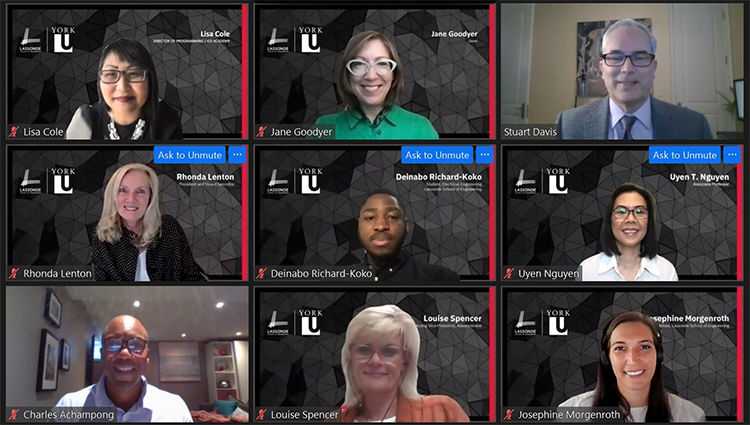The funding from Scotiabank provides $980,000 to support critical research into global financial crimes and security. It will be named the Scotiabank Lassonde Financial Crimes Research Initiative.
At a time when financial markets, technologies and products have become more complex and financial crimes are increasing, Canadian universities can play a critical role in addressing the global shortage of trained experts equipped to tackle these crimes – many of which can impact the most vulnerable such as children, newcomers and elderly.
On Sept. 13, York University announced a contribution from Scotiabank that will provide $980,000 to support a variety of initiatives at the Lassonde School of Engineering.
The funding will support research into global financial crimes and computer security, while also providing support for programs that advance equity, diversity and inclusion in science, technology, engineering and mathematics (STEM) fields.
“York University is profoundly grateful to Scotiabank for their generous investment of $980,000 in support of the Lassonde School of Engineering. This contribution reflects the shared commitment of York and Scotiabank to supporting diversity, equity, and inclusion in science, technology, engineering and math fields and to advancing the groundbreaking work of our researchers in the field of financial crime prevention,” said Rhonda L. Lenton, president and vice-chancellor of York University. “In recognition of this substantial investment, the fund that supports critical research in global financial crimes will be named the Scotiabank Lassonde Financial Crimes Research Initiative.”

This innovative research initiative will support the essential work of talented graduate students and advance research areas related to global financial crimes, which include Ponzi schemes, money laundering efforts and cryptocurrency-based crimes, along with other serious areas of crime such as human trafficking, wildlife trafficking, sexual exploitation and drug trafficking.
“There is a significant shortage of people with the specialized skills and knowledge to do this work,” says Uyen T. Nguyen, associate professor at the Lassonde School of Engineering. “This research program will also prepare students and emerging scholars for jobs. We are also helping to further promote Toronto as a global financial hub, and providing professionals and expert specialists to the industry locally.”
This work has already shown promise in the real world, says Nguyen.
“This initiative with the Lassonde School of Engineering builds on a long history of collaboration between Scotiabank and York University, spanning five decades,” says Stuart Davis, executive vice-president of financial crimes risk management at Scotiabank. “We are thrilled to be working with Lassonde’s students and faculty on leading-edge research to inform techniques used to combat financial crimes risk, while promoting a shared purpose to advance social sustainability goals.”
As part of Scotiabank’s generous investment in activities that advance equity, diversity and inclusion, the Lassonde School of Engineering’s Helen Carswell STEAM Program for Women will also receive support to encourage participation from Grade 10 and 11 students from marginalized neighbourhoods in a unique eight-week program of paid research in the school’s lab, which conducts work related to the United Nations Sustainabile Development Goals. High-school students in the program will work on research projects related to engineering and science under the guidance of undergraduate research assistant mentors, high-school teachers and Lassonde faculty.
As well, Scotiabank will support Lassonde’s Kindergarten to Industry Academy – expanding the K2I Academy to three Greater Toronto Area school boards to further enhance Grade 9 to 12 science and mathematics programs. Lassonde’s K2I Academy is an innovative ecosystem of STEM educators, thought leaders and partners focused on bringing STEM experiences to youth, educators and communities. K2I Academy is working with partners from Kindergarten to industry to dismantle systemic barriers and build sustainable programs that diversify representation in STEM professions.
“These programs are not just about STEM education. It’s social justice work,” says Lisa Cole, director of programming at K2I Academy. “We want to make sure that every student has a chance to explore the subjects before they make a decision about their path of studies. We want them to see the possibilities for their futures and the social impact they can make.”
Deinabo Richard-Koko, a third-year Lassonde student and mentor with the K2I Academy, says the program is unique in that it shows students how to apply their learnings in real time. “Most people say: ‘What does this add to my life? I’m never going to use this again outside the classroom,’ ” says Richard-Koko. “But with the K2I Academy, students can see the real-time application of what they learned. They can actually use it.”
The support from Scotiabank is already having a huge impact on Lassonde’s programs.
“This funding allowed us to make critical enhancements. We were able to purchase materials and resources, like small electronic devices for engineering learning, to help engage students in hands-on learning,” says Cole. “Without this gift, we wouldn’t have the creative space that we need to innovate and develop outreach materials for our students.”
The goal of these initiatives is to remove systemic barriers to access for underrepresented students in STEM and increase student achievement and enrolment in the prerequisite courses needed to enter post-secondary studies in engineering.
“At Lassonde, we know how important it is to support students of all backgrounds,” says Jane Goodyer, dean of the Lassonde School of Engineering. “That’s why I am pleased we are collaborating with Scotiabank through a shared sense of purpose, determined to equip every student with the skills and values needed to succeed in STEM fields as they work toward a better future.”
To learn more about Research & Innovation at York: follow us at @YUResearch; watch the animated video which profiles current research strengths and areas of opportunity, such as artificial intelligence and Indigenous futurities; and see the snapshot infographic, a glimpse of the year’s successes.
